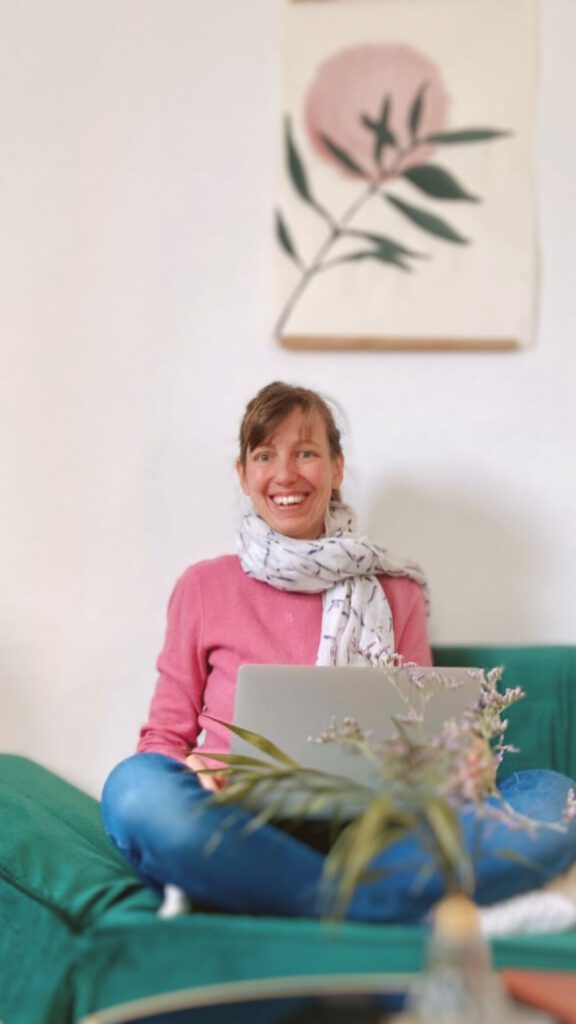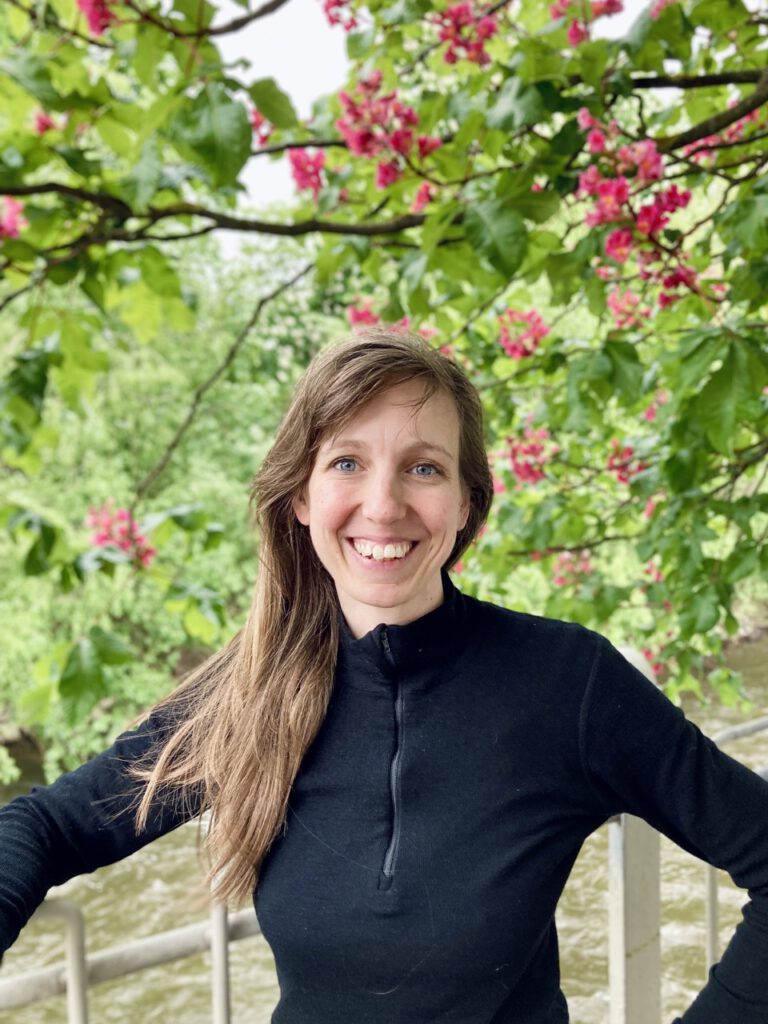Today I’m tackling a persistent myth: „Do you have to leave your comfort zone to grow?“
Spoiler: No, quite the opposite!
I passionately advocate on the contrary position. It is far from true that nothing supposedly grows in the comfort zone. With my coaching, I stand for a deeper level of well-being in everyday life: with body, emotions and intellect. I like to give the comfort zone a good reputation at last. It more than deserves it! Not only from my personal point of view, but also from a scientific one.
As a psychologist, blogger and as a mother, I want us to stop doing things that are detrimental to us. I want us to get out of unhealthy self-optimization together. I want us to find what we really need to flourish. And all of that starts in the comfort zone – but maybe not the way you think.
Find out what all this has to do with Queer Eye, neuroscience, and an epic finale in this post!
The conventional idea of a comfort zone
What do you think of when you hear the term ‚comfort zone‘? The phrase: You have to leave your comfort zone in order to grow? Or the social media version „A comfort zone is a beautiful place, but nothing ever grows there.“ Perhaps someone once told you that you need to move out of your comfort zone, dare something, push yourself beyond a limit. What does this phrase trigger in you?
Maybe it motivates you and you think: Yeah, let’s go, off to new adventures.
Then you can put a second perspective next to your own today.
Or maybe you feel the same way I do. All my life I have had the feeling of living outside my comfort zone. I am a person who perceives a lot and needs a lot of time to sort out all these impressions. For me, life has always been too fast, too loud, too much pressure. Day-to-day life is enough adventure for me! If someone wanted to take me „out of my comfort zone“, I keenly felt that I wanted to go in the other direction: I want to finally get to some place where my life feels like comfort, rest, quiet, peace, and ease.
I’ve been homesick for a state that somehow has always been at one remove. And I was ashamed of not keeping up with the pace of others. Do you recognize that?
I’ll be sure to write about how I found that way, too. But today, it’s about the goal: finally living a life where you feel completely at home. Coming home to yourself.

The nonsense around the comfort zone
You often hear: If you stay in your comfort zone, you don’t learn anything new. In fact, you slide backwards. It sounds like laziness, inertia, lack of interest. Who wants to say that about themselves?
When I read the first articles Google puts out about the comfort zone, all by coaches, I get the impression that fear and shame are being used in order to motivate individuals. You wouldn’t want to be one of „them,“ would you?
A look at the series Queer Eye shows why this is complete nonsense. Or any other shows in which people and houses get an all-around makeover.
(For those who think: Staying in your comfort zone means Netflix and chips – here’s your moment!)
In the first episode of the current season (7), the Fab Five meet a group of college students. Well, they want to meet them. But at 12 noon, the guys are all asleep! The house they live in together is a mess: the place stinks, it’s all full of empty bottles, food scraps, the sofa is dirty and broken, the kitchen is barely recognizable as such. I’d rather not start with the bathroom. In the hallway hangs a list. „Needs to be repaired: Upstairs“
Do you also have a voice that immediately judges: Oh, that’s typical! Frat boys! They can’t handle responsibility! Can’t get off their butts! No self discipline!
That’s the classic image we associate with „comfort zone“: Only do what I feel like doing. Leave everything else alone. And that inevitably leads to getting bogged down in dirt and problems.

How often do you feel like you know what you need to do, but you just can’t get it together?
Do you think you just need to be more disciplined? Or have a thicker skin, be more resilient to stress?
I often wonder how the authors of the original model even came up with the idea of describing this state as a comfort zone. I don’t know anyone who really feels comfortable in a life that consists only of monotony, partying, netflix, and a keeping a minimum routine of annoying chores.
Yes, I know many who just want to numb out in the evenings from stress. Who stay in the same rut every day. But do they feel comfortable there? Most of them dream of something else.
But then there’s that voice that says: If you do what you really want, you’ll soon have no job, no money, no future. So we keep pulling ourselves together. And maybe we make one or two attempts to optimize ourselves, so that eventually we will arrive at a point where we really feel at ease.
Often we remain in a state that does us no good because we don’t know how to get out of it. Sometimes even out of mental illness. It’s not fun or comfortable, no matter how it looks on the outside. And it’s not okay to be discounted for it either.
That’s ultimately how it was with the Queer Eye flat mates. More on that later.
What if there was another way? What could a life look like that doesn’t consist of duty fulfillment, exhaustion and far too little time for what we actually love?
What could possibly motivate us other than discipline and shame when we are being undisciplined?
The good news is: there is a way. And it’s available right now. Free of charge. And feels so good!
Are you ready?
The psychological wellbeing zone
Do you have younger children around you? What do all children have in common? What are they born with?
Curiosity. Children are incredibly curious from birth. That’s why they learn at an unstoppable pace. And they are utterly playful. Did you know that this is true of most mammals? But humans are the only ones in which curiosity and playfulness persist after childhood. There are theories that suggest this is why the human brain has evolved so highly.
When we look at children, we instinctively feel what it means to be in the true comfort zone. What do you want for your children? What do they need to grow, learn and flourish? Is discipline the first thing that comes to mind? Not for me. What comes to mind is security. Loving attention. Curiosity. Play.
The nervous system in its ideal state
It is precisely these qualities that we instinctively desire for our children that bring us, too into our own personal comfort zone. Dr Stephen Porges spent a long time researching what premature babies need to develop well. He learned an incredible amount from this and discovered that babies‘ nervous systems can be in three states: In shock (disconnect/dissociation), under stress (fight or flight mode), or in the ideal zone: which he describes as „safe and social.“ Depending on the situation, different branches of the nervous system will be activated.
When children are in this safe state, they develop significantly better, self-healing and development kick in. And he noted that these nervous system functions are maintained into adulthood.
The nervous system can perceive cues of safety or of danger. It almost doesn’t matter whether the threat is real in the here and now, or only present in the mind in the form of worry or painful memories. When the nervous system detects threat, our entire perception changes, and it does so physiologically. We sense things that are stressing us more clearly. For example, we hear different sounds because the muscle tension in the middle ear changes. In addition: we interpret our environment as more dangerous when our nervous system is alarmed. We learn with less ease. We are more likely to fall back on habits, even if they are not good for us. We turn our gaze downward, making ourselves physically small – without even realizing it.
So, when we leave our comfort zone and go too far into the area that scares or stresses us, our ability to learn, problem solve, and socialize deteriorates! And it happens automatically, outside of our conscious control.

Fascinated by this, Deb Dana developed this theory further and used it to design psychotherapeutic approaches. She discovered that people develop much more easily in a healing, beneficial way as soon as their nervous system enters a safe, calm state.
We now know that in psychotherapy it is less important what methods we use – it is mainly about creating an atmosphere in which client and therapist feel so safe and connected that the nervous system comes back into regulation.
This is the starting point for self-healing, new experiences, curiosity and also for processing emotional injuries. Anxiety and depressive cycles are inhibited directly within the nervous system. Curiosity, connectedness and openness return. The immune system regulates itself. And this is true not only after traumatic experiences, but for all individuals who have a nervous system.
So it’s very worthwhile to spend a lot of time in your comfort zone – you’ll live healthier, more creatively, and access your potential there!
Check in with yourself:
How can you tell if your nervous system is in a safe and social state?
- When you feel calm and safe
- When you feel like you have an open heart (emotionally, not physically 😅)
- When you find it easy to look others in the face and in the eyes
- When you find it easy to listen to a peaceful voice
- When your breathing is calm and steady
- When the energy you sense feels like curiosity and anticipation, rather than fear, anger or avoidance.
In coaching, this is where we start. I help you get to know your nervous system and bring it back to a calm, safe state. This is „coming home“ to the comfort zone. This is the starting point for a journey of discovery that begins with curiosity and openness.
Thoughts and beliefs: Back to Queer Eye
What else do you need to be happy? Besides our nervous system, our thoughts, evaluations and beliefs also play a big part in how comfortable we feel. Did you know that the state of the nervous system influences whether we are more likely to access positive or negative beliefs?
When we are alarmed, we tend to engage in thoughts that confirm this – worries, negative expectations, memories of painful experiences are activated. And when we feel safe and secure, we tend to have a more confident, optimistic and creative view of things. We also tend to expect our environment to support us and interpret the behavior of others more favorably.
So here, too, it is very worthwhile to first arrive physically and neurally in our comfort zone.

In Queer Eye, of course, it didn’t stop at the makeover of the house and fancy new clothes (even though they were really good!). One scene that touched me deeply sums up perfectly what it means psychologically to arrive in the comfort zone. In the zone where I am at home with myself.
Karamo Brown gathered the roommates on the beach. They sat in lawn chairs around the fire. Sounds pretty cozy already. And then he encouraged them. He talked about himself and his difficulties finding the right path for himself as a young man. How lost he had felt at times. And how hard it was for him to talk about it. And one by one he asked the young men what was on their minds. And it turned out:
They were completely overwhelmed. Because of Covid, they had more stress in their academic studies, they missed their social contacts, they had lost their jobs. They didn’t want to display any weakness and didn’t talk about it. They didn’t want to be a burden to anyone. And each thought the other had his life on track. Except me.
There were some tears. And yet I would say: This is exactly where the return to the true comfort zone began: They showed themselves as they really were. They saw each other as friends. They hugged. They listened. They began to support each other where before they had struggled alone.
Security and connectedness emerged. In this state, a whole new energy was released: relief. Hope. Friendship.
But how can we deal with life when we’re not in the safe and connected zone – and no Karamo Brown is coming to help us? When we are in the midst of stress, fate has played us havoc, or we are constantly worrying?
The Game-Changer
One of the most effective approaches to work with fears, worries and inner resistance is „Internal Family Systems“ (IFS by Dr. Richard Schwartz). It is not only very powerful, but at the same time simple and surprisingly gentle. That is why I am very enthusiastic about this way.
IFS assumes that we have many inner voices, so-called parts, that try to manage our lives as best they can. Some of them are helpful, others block us. Do you know this too, this inner back and forth? The inner child or the inner critic?
But the most important thing is: behind these voices there is a deeper level that does not need to develop or optimize. This self knows exactly what we need. You can recognize the „True Self“ (according to R. Schwartz) by seeing yourself and your inner parts in a new light. When you are in contact with your deeper Self, you feel towards yourself and others, even in difficult situations these qualities
- Compassion
- Courage
- Confidence
- Curiosity
- Connection
- Creativity
- Calm
- and Clarity.
How does that sound to you? What happens to you when you let these words sink in?
It is clear to me that this is the ideal psychological zone in which I would like to reside. I can’t stay there permanently. But I do know how to get back there again and again. And I’d like to show you, too, if you’d like.
Schwartz found that everyone, even his most severe cases (and he worked in prison, among other places) had this true Self. And once people could connect with it, they really only needed the therapist as a „guardrail“ – because they knew deep down what they needed to heal and flourish. And they could use that knowledge for themselves. Even if they had never experienced anything like it in their childhood.
For science, which considered adult behavior as learned in childhood, this was a paradigm shift.
I was incredibly fascinated by it. And, of course, I couldn’t resist trying it out. My own experience is that this work has changed me more than 10 years of intensive study of all other methods of psychotherapy.

And because it is so powerful, I want to share this path with you. That’s what I want to bring about with my coaching for people who want to return to their true comfort zone. We can learn to lead ourselves from the „self“. With these eight C qualities and the inner peace and freedom they bring.
I am convinced that empaths and sensitive people can greatly benefit and finally flourish when they walk this path.
Imagine if your inner driver would give way and hand over the leadership to your true Self?
A Self that is courageous and full of compassion?
That clearly and confidently shows the way?
That is curiously and creatively trying new things?
Do you really think your life would shrink from that?
An epic finale: My Legacy, Gentle Revolution and World Peace
My vision with Comfortzone Coaching is to empower empaths and help them to find their comfort zone. To refuel there without shame. To get in touch with our deep inner wisdom and to let our gentle power shine again.
My vision is that we will be curious again and simply play because it is fun. That we make real peace with ourselves.
My vision is also that this way of life is contagious. That a peaceful Self-energy will flow into our families, our partnerships, our friendships, our work. That your clients, without realizing it, take a portion of it home with them.
That’s what I want to inspire as a psychologist, as a blogger, and also as a mom.
Dick Schwartz now works with high-level political and business leaders to establish a new style of leadership in the top ranks of the world. To make the eight characteristics of Self a new culture in companies and entire countries. My heart rejoices at the idea that THIS could be our future.
Not allowing ourselves to rest, to play, to simply enjoy, ultimately means that we are abandoning ourselves. That we hand ourselves over to the standards of a culture that puts performance, productivity, and power first.
To rest unashamedly, as often and as long as we like, is a (small) act of resistace in a culture that exploits our labor without regard to physical or psychological loss – whether in China or right at home.
I have witnessed this kind of peace and inner freedom to be contagious. I have experienced that in the comfort zone, we not only make peace with ourselves, but we take it out into the world. I deeply hope that I can contribute to making the world a little more peaceful and free. And yes, I believe this approach has the stuff for a gentle revolution.
What could be your first, small step back into your own comfort zone?
Do you want to be part of it?
You can get in touch with me. Leave a comment with your thoughts and questions.
Share this article with people who might be inspired by it.
If you’re feeling a „full body yes“, and want someone to help you finding your way back to your true self, you might be interested in my IFS-informed coaching. I help you find your authentic self and regulate your nervous system.
Check out my offer for German Speaking folks or send me an e-mail.